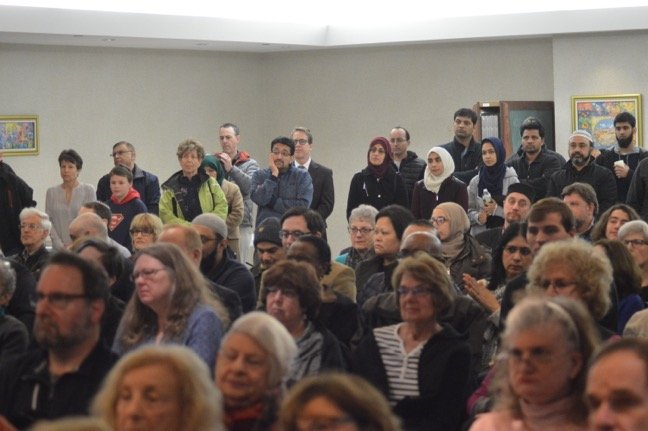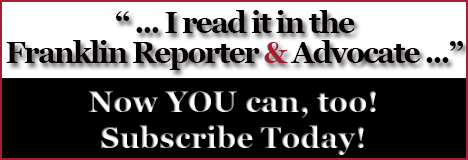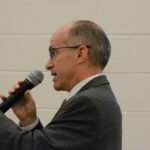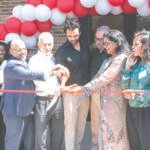New Zealand Mosque Attack Victims Remembered In Temple Beth El Vigil

Part of the crowd that packed Temple Beth El March 16 for a vigil honoring the victims of the two New Zealand mosque attacks.
People of all faiths packed Temple Beth El March 16 for a vigil in honor of the victims of the mosque shootings in Christchurch, New Zealand
The roughly hour-long commemoration featured comments by political and faith leaders from the township and the region.
The vigil was sponsored by the Franklin Township Interfaith Council, whose vice-president is Temple Beth El’s Rabbi Eli Garfinkel.
Garfinkel welcomed the attendees, and said that he hoped “that the survivors of Christchurch will see this somehow and they will know that we care and that we condemn the hatred that causes this perverse violence.”
“New Zealand is almost 9,000 miles away from us here in New Jersey, there are no direct flights,” Garfinkel said. “In fact, it is so far away that it is not even the same day there. And yet, it is also right next door because what happened is so frightening and hit so close to home.”
“The problem is not the murderers themselves, the problem is the hate that fuels them,” he said. “Cut off the fuel, and the killings will stop. We must cut their fuel line, the hatred that grows like a disease, especially in the darker corners of cyberspace.”
Garfinkel called for a “Manhattan Project for the human soul” to stop the spread of hate in the world.
“We cannot ban hatred … rather, we have to make this kind of hate socially unacceptable, something that good people do not do, that people who think of themselves as good people would never do,” he said. “All good people must combine forces against our common enemy, the so-called white nationalists and white supremacists. They are not supreme. Nor do they have anything in common with the nation that I know.”
Imam Rizwan Rizvi, of the Masjid-e-Ali mosque, told the standing-room-only crowd that “losing hope is amongst the sins.”
“A day like this, a day when we feel hopeless, a day when we think we cannot do anything, a day when the clouds of hatred and bigotry are all around in the atmosphere, we look around at (verses in the Quran) and we see that indeed after hardship, comes peace. Indeed there is peace that accompanies hardship,” he said.
“I’m honored that our brothers have extended this hand and invited us,” Rizvi said. “And the love that is here in this atmosphere, but tomorrow, God forbid, another incident takes place, someone yells out Allahu Akbar, misrepresents my religion, the religion of Islam and, God forbid, blows up a place. Then we go back to square one.”
“That whole entire rhetoric of hate, that narrative has to be changed,” he said. “This person did not belong to any particular religion, nor will that person who, hopefully not, will perpetrate a crime in the name of Islam. Let’s not lose hope in these difficult times.”
Mayor Phil Kramer was clearly taken aback as he looked up from the podium and saw the immense crowd.
“Wow. People in front, look behind you,” he said.
Kramer said he looked back to what he said during the vigil that was held in the mosque after the killings in a synagogue in Pittsburgh, Pa. for inspiration for what to say that night.
“This is a breakdown of the fabric of civil society,” he said. “We now live in an America where one could be the subject of violence because of their ethnicity, religion, gender identification or civilly stated political views.”
“Now we live in a world where that is true. New Zealand. New Zealand is special to me, my sister and niece in-laws are from New Zealand,” he said. “I called them Friday to tell them I was thinking of them. They were in shock. New Zealand is a country where many don’t lock their doors and police keep their guns in the trunks of their cars. So now, it can even happen in New Zealand.”
“And I’m the Mayor, and I’m supposed to give you strength and inspire you to renew your faith in humanity and your faith in our future,” Kramer said. “But I can’t give you strength, because in fact, it is you who gives strength to me.”
“Franklin, you inspire me,” he said. “You lift me up. I’m so proud of you because tonight we are all Muslim, we are all Jews, we are all Catholic and Jain and Protestant, Buddhist, Atheist, Hindi, Sikh, Shinto and Unitarian and so many more that I haven’t heard of and can’t pronounce. We are more than a classification, we are a community, and we strive for better.”
Alex Kharazi, president of the Interfaith Council and also a founder of the Masjid-e-Ali mosque on Cedar Grove Lane, said that “probably none of us know the victims, and we will never know them. We will never know the grandfather who approached the shooter to extend a greeting of peace and in response, he was shot to death.”
Speaking about the Pittsburgh vigil, Kharazi said, “we came together then and we have come together now to remember the victims and affirm our determination that we strive to care for one another and we want to live in a peaceful community free of hate and bigotry.”
U.S. Rep. Tom Malinowski (D-7) told the crowd that “Every time these fanatics do this, they bring us closer together.”
“To my Muslim friends, I say, thank you for being here,” he said. “Not just here in this synagogue, thank you for being in America. Thank you for the businesses you create, the children you teach, for the patients you heal. Thank you for serving in the military and police, thank you for the culture you bring to enrich our lives, thank you for understanding and fighting for what makes America a special country in the world.”
“This is my pledge to you,” Malinowski said. “When I go back down to Washington, I’m going to do everything in my power to hold accountable the people who use this kind of rhetoric, who spread those conspiracy theories. I will work with my colleagues to do what should have been done a long time ago, to invest in the resources that are needed in the law enforcement community, in the intelligence community, to protect our community from white supremacist terrorism.”
The Rev. George Montanari, pastor of Middlebush Reformed Church, said he wondered if gatherings such as these “are enough.”
“I wonder if this is enough, if gathering tearfully, mournfully and sincerely once more is enough,” he said. “Maybe it means to do something in the week ahead to show that we will be light in the midst of darkness, that we will look around the room tonight before we leave and we will identify someone we don’t know, in a faith tradition not familiar and seek to become a neighbor and a friend to that person.”
“To think about the words we say and the things that flood into our hearts in moments of deep passionate feeling, of anger or disgust or dismay and decide whether we will let those things rule, or the those thoughts of peace and of mercy and of care of our neighbor,” he said.
“Let the people of the world agree that we will not kill each other, that we will seek to learn from one another’s differences,” he said.
State Assemblyman Roy Freiman (D-16) said that hatred, if left unchecked, “will grow and ruin everything of beauty. We know that hatred is learned.”
“Nothing is stronger than community, nothing is safer than community,” he said. “That will never change. That has kept us the safest and will always keep us the safest.”
“We’re here to mourn the loss of those who were innocently murdered,” Freiman said. “We’re here for solidarity and as a community to stand up to hatred. I took a pledge to stand up to hatred, and it will never have a home here, or wherever I am standing, and I hope that you will stand up with me as well.”
Ross Pearlson, the New Jersey Board chairman of the Anti-Defamation League, said that “we have to recognize white supremacism for what it is, a brand of international terrorism that must be stopped. We have to monitor the groups that propagate it on the Internet and social media to gauge their intentions and ID those who they are indoctrinating.”
“We need to meet these messages of hate and division with words of love and togetherness,” he said. “We need to condemn white supremacism and all that it stands for and rise up against those who propagate it.”
Township houses of worship are under the Franklin Township Police Department’s protection “24 hours a day, seven days a week,” said FTPD Lt. Mark Reiner.
“I work closely with county, state, federal and even some of our international police agencies,” he said. “We do this so we can stay on top of the trends in terrorism and we can quickly and accurately react to any incident that occurs.”
Somerset County Freeholder Director Brian Levine told the crowd that “those filled with hate can sometimes hurt us physically, but they cannot weaken us spiritually. We can implant an artificial limb, but there’s no prosthetic for a mutilated spirit.”
“I say to you now, if other members of our government or our community will not do this for us, we in Franklin and we in Somerset and our leaders who represent us in Trenton and Washington will do this for ourselves,” he said.
“We’re here as a community and we’re upset, but we’ll be there for each other,” Levine said. “As long as people in Franklin and the Somerset community need understanding, we’ll all be there for each other. We’ll be there because we are one and we understand each other, and we are united.”
The Franklin Reporter & Advocate live streamed the vigil:
https://www.facebook.com/franklinreporter/videos/401478474013393/























































